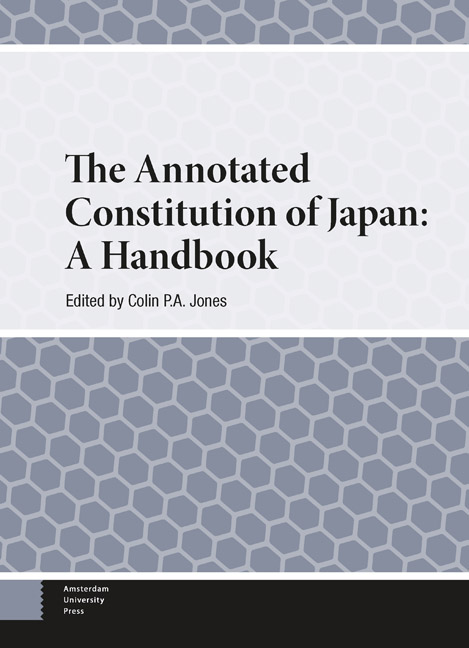Book contents
- Frontmatter
- Dedication
- Contents
- Contributors
- Preface
- Acknowledgements
- Introduction: Historical Overview
- The Preamble
- 1 Chapter I: The Emperor (Articles 1–8)
- 2 Chapter II: Renunciation of War (Article 9)
- 3 Chapter III: Rights and Duties of the People (Articles 10–40)
- 4 Chapter IV: The Diet (Articles 41–64)
- 5 Chapter V: The Cabinet (Articles 65–75)
- 6 Chapter VI: The Judiciary (Articles 76–82)
- 7 Chapter VII: Finance (Articles 83–91)
- 8 Chapter VIII: Local Self Government (Articles 92–95)
- 9 Chapter IX: Amendments (Article 96)
- 10 Chapter X: Supreme Law (Articles 97–99)
- 11 Chapter XI: Supplementary Provisions (Articles 100–103)
- Appendix 1 Constitution of the Empire of Japan (Japanese)
- Appendix 2 Constitution of the Empire of Japan (English translation)
- Appendix 3 The Potsdam Declaration
- Appendix 4 Instrument of Surrender
- Appendix 5 The “MacArthur Notes”
- Appendix 6 The GHQ Draft
- Appendix 7 The Constitution of Japan (Japanese)
- Appendix 8 The Treaty of San Francisco
- Bibliography
- Index
- Index of Articles of the Constitution of Japan
1 - Chapter I: The Emperor (Articles 1–8)
Published online by Cambridge University Press: 13 February 2024
- Frontmatter
- Dedication
- Contents
- Contributors
- Preface
- Acknowledgements
- Introduction: Historical Overview
- The Preamble
- 1 Chapter I: The Emperor (Articles 1–8)
- 2 Chapter II: Renunciation of War (Article 9)
- 3 Chapter III: Rights and Duties of the People (Articles 10–40)
- 4 Chapter IV: The Diet (Articles 41–64)
- 5 Chapter V: The Cabinet (Articles 65–75)
- 6 Chapter VI: The Judiciary (Articles 76–82)
- 7 Chapter VII: Finance (Articles 83–91)
- 8 Chapter VIII: Local Self Government (Articles 92–95)
- 9 Chapter IX: Amendments (Article 96)
- 10 Chapter X: Supreme Law (Articles 97–99)
- 11 Chapter XI: Supplementary Provisions (Articles 100–103)
- Appendix 1 Constitution of the Empire of Japan (Japanese)
- Appendix 2 Constitution of the Empire of Japan (English translation)
- Appendix 3 The Potsdam Declaration
- Appendix 4 Instrument of Surrender
- Appendix 5 The “MacArthur Notes”
- Appendix 6 The GHQ Draft
- Appendix 7 The Constitution of Japan (Japanese)
- Appendix 8 The Treaty of San Francisco
- Bibliography
- Index
- Index of Articles of the Constitution of Japan
Summary
Overview
Just as with the Meiji Constitution, the first substantive provisions of the Constitution of Japan address the status of the emperor. A comparison of Chapter I of both charters reveals how much the role of the emperor has changed. Whereas under the Meiji Constitution he was vested with the vast powers of sovereignty, some of which were delegated to other parts of government (the judiciary, the Imperial Diet), under the current constitution he exercises a more limited range of powers and then only symbolically, always bounded by the “advice and approval” of the Cabinet.
Today the provisions of Chapter I are something of a constitutional backwater. Few court cases have arisen under any of its provisions and its eight articles generate almost no jurisprudence and little controversy, one exception to the latter being the question of succession, as discussed at Article 2.
The seemingly innocuous nature of Chapter I belies the controversy its generated at the time of the constitution's birth. Meiji constitutionalism had been dominated by the notion of kokutai (literally, the “body of the nation”), which under the Meiji Constitution became the expression of an entire system of Japanese society, religion and government with the emperor at the center. To question the role of the emperor, or even characterize it in a heterodox way could be a form of lesè majesté, or at least career suicide, as some constitutional scholars discovered the hard way. One of the reasons why communism was regarded as anathema in prewar Japan was because of its call for the abolition of the imperial system. To question the kokutai was a form of thought crime that led to the arrest of intellectuals and their “conversion” to the correct way of thinking. Seeking assurances from the allies about the preservation of kokutai—the emperor—as a possible condition for accepting the Potsdam Declaration arguably led to the dropping of the atomic bombs. Even in the face of total defeat, therefore, the dramatic changes demanded by the Americans in the role and characterization of the emperor were problematic for Japanese political leaders.
- Type
- Chapter
- Information
- The Annotated Constitution of JapanA Handbook, pp. 15 - 31Publisher: Amsterdam University PressPrint publication year: 2023



